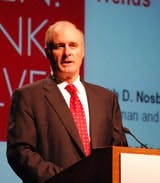Rockwell Automation Eyes Converging Trends
"Everything that rises must converge." Flannery O'Connor first said it, rather prophetically, in the title of her 1961 short story, but Keith Nosbusch, CEO and chairman of Rockwell Automation, demonstrated its applicability to machine- and process-automation trends occurring today.
"The convergence of control, power, communications and information technology is unfolding," said Nosbusch, who opened the company's Manufacturing Perspectives international media gathering, held in conjunction with Automation Fair this week in Anaheim, Calif. "More than 60 nations are represented to find ideas here at Automation Fair, the world's largest forum of automation and technology," he said. "Our goal is to help make the most of their investments and improve their competitiveness."
Nosbusch reported fiscal 2009 sales of around $4.3 billion for Rockwell Automation and its 19,000 employees, with approximately half of that coming from outside the U.S. Sixty percent of total revenues came from its Control Products and Solutions business segment, while the Architecture and Software segment accounted for the other 40%.
"It's been a tough economic environment," explained Nosbusch, "but our long-term growth and performance strategy has not changed. The success of this strategy will be measured by performance." Rockwell Automation's performance metrics include future revenue growth of 6-8% and return on invested capital of more than 20%. And as the manufacturing world shifts its center of gravity to developing markets, Nosbusch predicts 60% of automation growth will be outside the U.S. by 2013.
Rockwell Automation's plan for thriving in the poised economy is based on three targeted areas that can be leveraged, based on the converging trends. "Plant-wide optimization, agile supply chain and sustainable production are driving this convergence where power, control, communications and information technology come together," said Nosbusch.
"IT-connected manufacturing is transforming to an optimized plant and supply network," he explained. "Agile supply chains require effective management. The supply chain is becoming an increasingly important link in the optimized plant and supply network with real-time visibility of customer demand."
Nosbusch explained how food companies are changing their packaging capabilities to accommodate different sizes, all enabled by the integration of real-time customer demand information with the manufacturing process. "Manufacturers today must create an architecture that serves information," he said. "Plant-wide optimization means manufacturers and OEMs will be able to test in virtual environments, lowering costs and improving productivity and quality."
Energy and environmental issues are the third leg of the stool. "The next generation of smart technology will be needed to meet environmental goals," said Nosbusch. "By capitalizing on smart grid technologies, companies should save more than $6 billion in the U.S. alone. Through sensing, communication, control and optimization, new technologies are converging for active energy management. Making our factories environmentally friendly will mean transforming every factory into a smart node on the smart grid."
A core technology enabler is a secure Ethernet infrastructure, Nosbusch continued. "This is mandatory for the unification of control and IT, and why we're working in partnership with Cisco," he said. "Multiple modes of business communications will be integrated, including wireless. We'll also see a growth that uses open international standards. The evolution of Rockwell Automation addresses these technology trends."
Nearly a decade after its launch, the Logix architecture is being expanded to accommodate the trends and opportunities Rockwell Automation has identified. Logix now integrates energy monitoring, can act as a factory-floor information server and features improved scalability to support a broader scale of applications.
Rockwell Automation sees significant growth potential in process industries, the OEM market, sustainability, safety, information and emerging markets. The process control market, specifically its oil and gas component, has become one of Rockwell Automation's largest verticals with the release of PlantPAx and the acquisition of ICS Triplex, said Nosbusch. But six OEM segments remain important—process, manufacturing/assembly, energy, packaging, converting, printing and web, and material handling.
Software is a logical extension of Rockwell Automation's foundation in control, explained Nosbusch. Automation software is primarily configuration and visualization software, while information software has a broad range of capabilities that use real-time data to optimize processes and data from the plant floor.


